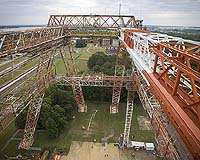 |
Princeton NJ (SPX) Jul 20, 2009 On the eve of the 40th anniversary of the U.S. moon landing, a majority of Americans say the space program has brought enough benefits to justify its costs. The percentage holding this view is now at 58% and has increased over time. Notably, those old enough to remember the historic moon landing are actually somewhat less likely than those who are younger to think the space program's costs are justified. Among Americans aged 50 and older (who were at least 10 years old when the moon landing occurred), 54% think the space program's benefits justify its costs, compared with 63% of those aged 18-49. The July 10-12 Gallup Poll also finds that most Americans continue to express support for the current level of funding for NASA (46%) or an expansion of it (14%). But the 60% holding these views is on the low end of what Gallup has measured since 1984, when the question was first asked. The two lowest readings of 46% and 53% were found in a pair of 1993 polls. In 1993, as now, Americans had highly negative evaluations of the economy, and the results suggest that when Americans have a negative outlook on the economy, they are apparently less willing to spend money for space exploration. In addition to a struggling economy, the lower 1993 NASA ratings are due to a number of problems that plagued the agency, including losing contact with the Mars Observer and several last-minute cancellations of planned space shuttle missions. The high point in support for current or larger funding levels for NASA was 76% in January 1986, immediately after the space shuttle Challenger disaster.
NASA Gets Favorable Performance Review Ratings of NASA vary by education. Sixty-three percent of college graduates say NASA is doing an excellent or good job, compared with 55% of Americans without a college degree. The educational differences are even greater in opinions on space program spending, with more than 7 in 10 college graduates saying the space program's benefits justify its costs and that NASA spending should be kept the same or increased. Only a slim majority of college non-graduates share these views. Bottom Line Americans remain broadly supportive of space exploration and government funding of it. In fact, Americans are somewhat more likely to believe the benefits of the space program justify its costs at the 40th anniversary of the moon landing than they were at the 10th, 25th, and 30th anniversaries. Although support for keeping NASA funding at its present level or increasing it is lower now than it has been in the past, the fact that 6 in 10 Americans hold this view in the midst of a recession suggests the public is firmly committed to the space program.
Survey Methods Interviews are conducted with respondents on land-line telephones (for respondents with a land-line telephone) and cellular phones (for respondents who are cell-phone only). In addition to sampling error, question wording and practical difficulties in conducting surveys can introduce error or bias into the findings of public opinion polls. Share This Article With Planet Earth
Related Links Gallup Poll Space Tourism, Space Transport and Space Exploration News
 NASA 'Builds' For The Future
NASA 'Builds' For The FutureHampton VA (SPX) Jul 20, 2009 Building on nearly a century of exploration, aeronautics research and scientific discovery, NASA's Langley Research Center has broken ground for the first building in its "New Town" program, a $200-million facility improvement project designed to enhance mission performance capabilities and renew current facilities. In partnership with the U.S. General Services Administration (GSA), NASA ... read more |
|
| The content herein, unless otherwise known to be public domain, are Copyright 1995-2009 - SpaceDaily. AFP and UPI Wire Stories are copyright Agence France-Presse and United Press International. ESA Portal Reports are copyright European Space Agency. All NASA sourced material is public domain. Additional copyrights may apply in whole or part to other bona fide parties. Advertising does not imply endorsement,agreement or approval of any opinions, statements or information provided by SpaceDaily on any Web page published or hosted by SpaceDaily. Privacy Statement |